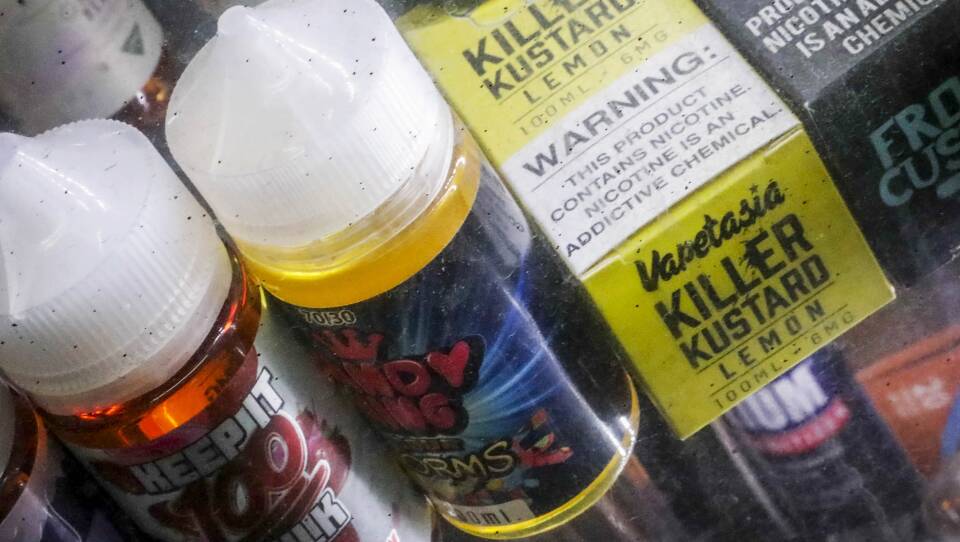Vaping has been marketed as a safer way of ingesting nicotine and marijuana, but recent news of more than 500 possible cases of a vaping-related lung illness is prompting some state and local governments to consider setting new regulations on how vaping products are regulated. WGBH Morning Edition Host Joe Mathieu spoke with Northeastern University law professor and WGBH legal analyst Daniel Medwed about the legal issues at play in this debate. The transcript below has been edited for clarity.
Joe Mathieu: To be clear, we're still in the very early stages of pinpointing the cause of these health problems, and I guess there could be several based on what we're learning. But some government officials are already moving on this. What are some of the proposals to handle this around the country?
Daniel Medwed: There are a series of proposals across the country, and I'd like to slot them into two different categories. First, there are proposals designed to deter juveniles from purchasing flavored e-cigarettes — candy-flavored ones, in particular — that are particularly enticing to teenagers. New York has instituted a ban, Michigan is on the cusp of doing so [and] even President Trump has weighed in at the federal level. The second category concerns deceptive or manipulative advertising practices. Michigan's proposal, for instance, would ban manufacturers of vapor products from advertising them as "safe," "harmless," "healthy" [and] "clean," and also bar advertising of these products near food or candy in certain stores.
Mathieu: Last week Gov. Baker talked about this a lot. [He] said he was looking at what emergency options the state might have to address the sale of vaping products. Mayor Walsh proposed regulations to limit where mint and menthol nicotine products can be purchased, getting back to that flavor element. But there are a lot of ideas out there.
Medwed: I think there are a lot of ideas. I believe about 150 or 160 municipalities in Massachusetts already restrict or ban candy flavored e-cigarettes. It's more of a speed bump than a barrier, because you could probably just go to the next town to get it. So a statewide ban might be more comprehensive and effective. My understanding is over the summer, there was a proposal floating in the State House, and I believe there was a hearing before the Joint Committee on Public Health about it. [I'm] not sure exactly where that stands. There is also talk of a very extensive excise tax. You could really just tax these products to the point where they're very difficult to move. So there are a number of products available. Though, of course, retailers aren't happy.
Mathieu: Is there a fairness issue there? Convenience stores [and] liquor stores say, "Hey, wait a minute. You're changing the rules."
Medwed: Absolutely. A lot of convenience stores [and] liquor stores, as you point out, are saying why should certain stores — vaping stores, tobacco product stores — get beneficial treatment? Why should stores in certain municipalities be able to sell these products and not in others?
Mathieu: Because they're all making a lot of money.
Medwed: They're all making a lot of money. On the one hand, Massachusetts affords a lot of leeway to municipalities in setting local public health regulations. In fact, the courts have been very benign [and] generous to these municipalities and upheld them over the years. On the other hand, retailers have filed a bunch of lawsuits against municipalities over the summer where they're claiming that these restrictions are arbitrary and capricious, that it's an overreaching of the police power and that basically they're already complying with federal law. Why should they be subject to this additional burden? It might take a while to see how this plays out.
Mathieu: So you're suggesting this could be tied up in court for a while, but also that this could come down to a town by town, city by city patchwork.
Medwed: It could depending on whether the Massachusetts legislature decides to implement a comprehensive ban, and at this point that's a little bit unclear. If the legislature doesn't act, then it may very well come down to this patchwork quilt of regulation.
Mathieu: Or it may be that prompts state lawmakers to get busy as we've seen before, Daniel. Even if Massachusetts beefs up regulations — age limits, excise taxes, everything we've talked about here — what's to stop people from just bypassing local retailers and buying on the black market?
Medwed: Absolutely. That's an argument a lot of retailers make — that this is just going to push the market to the shadows, to the internet and to the black market. Massachusetts does have a law that for you to buy e-cigarettes online, the company has to have age verification requirements and it has to demand that an adult sign for the package when it arrives on your doorstep. But again, as I mentioned before, that's probably more of a speed bump than a barrier. There are probably some ways around it. So I think it remains to be seen. We're in the early stages of this crisis, and we're also, I think, in the early stage of targeting some solutions.





